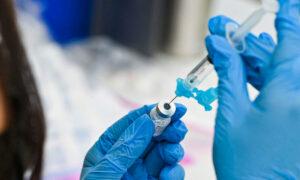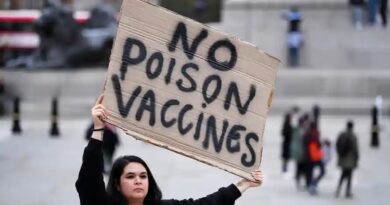Another Study Finds Risk of Heart Inflammation After Pfizer COVID-19 Vaccination
Most cases of post-vaccination myocarditis and pericarditis were found among adolescents between 12 and 17 years old
The risk of certain heart complications “significantly increased” after Pfizer’s mRNA COVID-19 shots, according to a new study from Thailand.
Researchers analyzed health data acquired from the Thai national vaccine and insurance claims databases.
They observed “a significantly increased risk of myocarditis and pericarditis” among people injected with three doses of Pfizer’s mRNA COVID-19 vaccine. Researchers couldn’t confirm such risks among individuals who took two Sinopharm shots and a Pfizer shot.
As Pfizer jabs are mRNA vaccines that produce the COVID-19 spike protein to trigger an immune response, “there is a possibility that the spike protein could cross-react with proteins involved in heart muscle contraction,” the researchers suggested.
In contrast, the Sinopharm jab is an inactivated virus vaccine rather than mRNA.
“Our findings align with the results of large studies conducted in Western countries, which indicate a higher risk of myocarditis and pericarditis, particularly among adolescent males, following [Pfizer] vaccination.”
Study Size
The health data of over 10.5 million individuals were analyzed, out of which 7.59 million took Pfizer shots while 2.91 million took the Sinopharm plus Pfizer combination.
- In total, 220 cases of hospitalization due to myocarditis were identified among both groups within 30 days of vaccination. Males accounted for 70.1 percent of the cases.
- Out of the 220 incidents, 215 were from the group that took only Pfizer; 144 out of the 215 myocarditis cases among the Pfizer-only group occurred after the second dose of the vaccine. The group that took the combination vaccine only registered five myocarditis cases.
- One death was registered in the vaccine group.
- Most cases of post-vaccination myocarditis occurred in adolescents between 12 and 17 years old and were diagnosed within seven days after vaccination, the study said.
Findings regarding pericarditis:
- There were 50 cases of pericarditis identified within 30 days of vaccination, with males accounting for 44 incidents. As with myocarditis, individuals between 12 and 17 years old were the most affected.
- Out of the 50 cases, 47 were from the group that only took the Pfizer shot, and 26 of those 47 cases occurred after the second jab. The combination group only registered three pericarditis cases.
- No deaths were reported in the vaccine groups.
The study did not mention any source of funding. However, the authors declared “no known competing financial interests or personal relationships that could have appeared to influence the work reported in this paper.”
Vaccine Dangers
The high risk posed by COVID-19 vaccines was highlighted during a Jan. 11 press conference conducted by the Vaccine Issues Study Group from Japan.
“A systematic review of the literature has revealed some surprising facts,” Professor Emeritus Masanori Fukushima of Kyoto University said during the conference.
“Thousands of papers have reported side effects after vaccination, which affect every organ without exception ranging from ophthalmology to general medicine to psychiatry. … This kind of reporting on drug side effects or the like is unprecedented.”
The group is working on a soon-to-be-released paper.
According to its findings, “the age-adjusted mortality rate for leukemia has increased” following vaccination campaigns. “And there are significant findings for breast cancer, ovarian cancer, and so on.”
Brain-related adverse events “came up in abundance” and were “endless,” Mr. Fukushima said, pointing to reports of mental disorders, psychiatric symptoms, depression, mania, and anxiety. “As I mentioned earlier, medicine is still immature,” he concluded.
Obstacles to Reporting the Truth
While Japanese doctors are “trying hard” to bring the dangers of vaccines to light, they are facing “various obstructions,” Mr. Fukushima stated.
“There’s this sentiment of ‘why report something like vaccine damage?’ There are interferences. Such actions themselves hinder academic freedom. And in some academic departments, censorship is taking place.”
Professor Yasufumi Murakami from Tokyo University of Science said that “the mechanism by which adverse effects occur is well understood—the spike is toxic,” referring to the spike protein from the mRNA vaccines.
“There are cases that occur within one or two weeks after injection, but there are also many cases that appear after one or two years,” he said, indicating long-term negative consequences of the vaccines.
Earlier in January, Florida Surgeon General Dr. Joseph A. Ladapo called for a halt in the use of COVID-19 mRNA vaccines, pointing to safety issues, including concerns about DNA contaminants. He expressed worry that the foreign DNA in the vaccines may be integrated into human subjects.
“DNA integration poses a unique and elevated risk to human health and to the integrity of the human genome, including the risk that DNA integrated into sperm or egg gametes could be passed onto offspring of mRNA COVID-19 vaccine recipients,” his office said in a Jan. 3 bulletin.
“If the risks of DNA integration have not been assessed for mRNA COVID-19 vaccines, these vaccines are not appropriate for use in human beings.”
This article has been archived for your research. The original version from Epoch Times can be found here.






